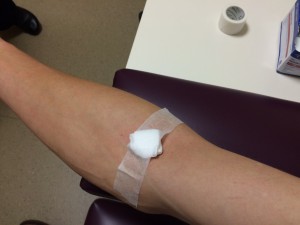Do I or did I have too much iron in my brain?
Hypothesis: My Parkinson’s onset might be related to my iron storage gene or perhaps red meat intake.
OK, This one got my attention. Not only do I hunt and we regularly have venison in the freezer, but I also have an iron storage gene.
On 23 and me I did discover I carry one of the variants for hereditary hemochromatosis – at marker rs1799945 – H63D on the HFE gene (HFE “Homeostatic Iron Regulator” is a Protein Coding gene). This single gene trait rarely causes “iron-overload” and fortunately I have regularly tested ferritin and % iron saturation in my blood for decades and it is never elevated. But could this have played a role?
The correlation between iron and neurodegenerative disorders including Parkinson’s disease (PD) dates back to 1924, when Lhermitte et al. demonstrated accumulation of iron in brain autopsies [http://dx.doi.org/10.1136/jnnp.s1-5.19.195]. Many studies have confirmed this finding, raising questions about correlation versus causation. For context, iron can be a primary cause of inflammation, but all inflammation requires iron. Therefore any bodily inflammation, whether caused by viral illness, trauma or degenerative process results in localized iron elevation. It is therefore very possible that these brain accumulations of iron only tell us a story that there is or was an inflammation process. So researchers have recently unpacked the iron-as-cause possibility.
We start with what is true, there is evidence that higher iron is found in the area associated with Parkinson’s pathology (dopamine producing neurons in the substantia nigra) [https://doi.org/10.1016/S1474-4422(14)70117-6]. So we would think that people with gene mutations that trigger extra iron storage in the body (up to 7% of the population on average) would be at higher risk of developing PD. But there was NOT an expected correlation with Europeans with hereditary hemochromatosis genes and the development of PD. [http://dx.doi.org/10.1136/jnnp.2006.101352]
And in those without these genes, blood donation is known to lower iron stores in the body, so does phlebotomy like blood donation lower PD onset? Researchers in 2006 looked into this, stating, “Our hypothesis was that blood donation reduces the risk of PD by lowering systemic iron stores. Although the number of blood donations was inversely related to the ferritin levels in a subsample of the study population, no association was found between the number of blood donations and risk of PD. Unexpectedly, the risk of PD was higher among men who reported recent multiple blood donations (P for trend = 0.05). The results of this study do not support the hypothesis that reduced systemic iron stores lower the risk of PD.” [https://doi.org/10.1002/mds.20826]
Then other researchers looked more closely at the unlikely finding that iron might be protective to Parkinson’s onset. And with a meta-analysis in 2013 concluded there could be a 3% reduction in Parkinson’s onset associated with nonpathological elevations of iron over a lifetime. [https://doi.org/10.1371/journal.pmed.1001462]
My Conclusion about iron and PD?
It appears iron elevations in the midbrain (on autopsy) are a correlation conundrum rather than cause and effect.
I would try to keep blood iron levels to reasonable levels (measure as serum ferritin: 30-150 ng/mL for women and 50-300 ng/mL for men). My iron storage gene H63D is of no significance to my PD onset or progress, but you should check your ferritin levels if there is any question for you and this is especially important if you carry any genetic trait that stores extra iron. Importantly, most blood test panels at TheBloodCode include ferritin. Unless deficient on blood tests, no one should use a supplement that contains iron. And happily, I will continue to include modest amounts of healthy, non-processed game and red meat in my diet.




Comments are closed.